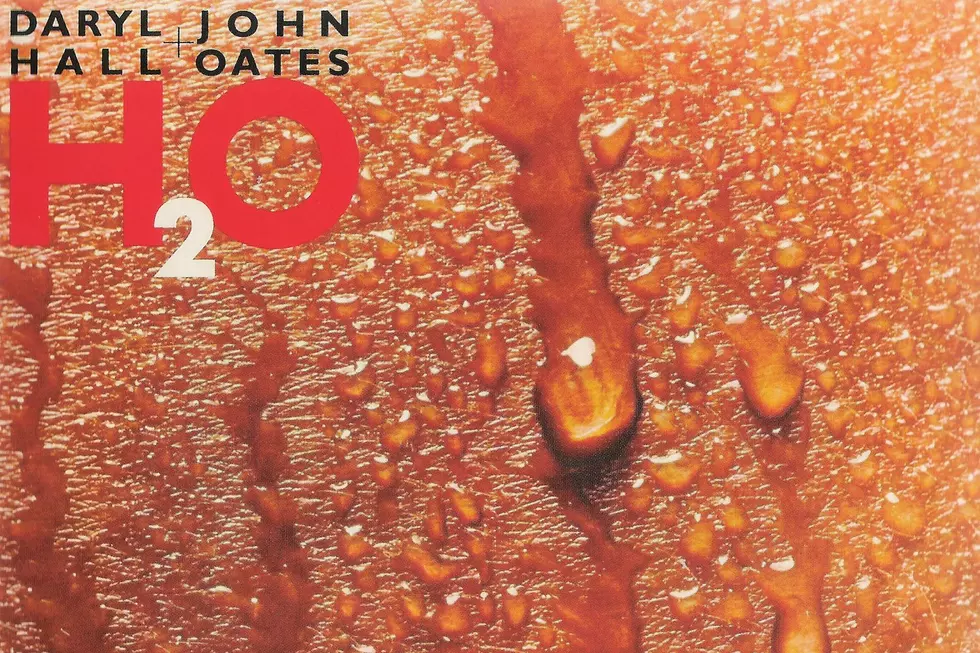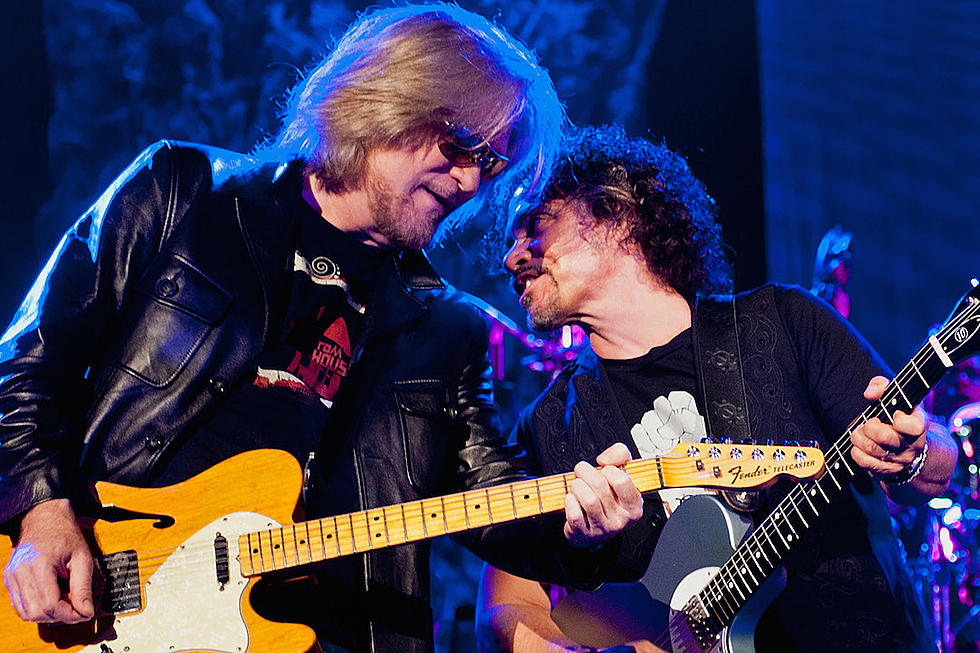
How Hall and Oates Sharpened Their Sound on ‘H20′
Hall and Oates shifted focus to the mechanized '80s zeitgeist on H20, building on the long-hoped-for fame they'd earlier achieved with a turn toward sleek New Wave. Yet through all of those adaptations, Daryl Hall argued, they never abandoned their R&B roots.
"We've changed, certainly – we've changed a lot," Hall told the Chicago Tribune in 1985. "I've changed as a person. Where I've lived and what I've done has certainly influenced my music. What I hope has never changed is that there's soul in it. Soul is something I hope never leaves the music, no matter what I'm doing and how I'm presenting it."
Remaining true to themselves, even in an era of rapid evolution in the industry, meant their audience just kept growing. Released in October 1982, H20 became Hall and Oates' highest-charting Billboard smash. Their first-ever multi-platinum release ended up producing three Top 10 singles, including "Maneater," their fifth chart-topper.
H20 also found the band solidifying around Hall and Oates. Hall, John Oates, guitarist G.E. Smith (who said his initials stood for "Great Entertainment") and saxophonist Charlie DeChant were joined by bassist Tom "T-Bone" Wolk and Mickey Curry, who had appeared on select tracks from 1981's Private Eyes. Wolk would remain in the group until his 2010 death, while DeChant – nicknamed "Mr. Casual" – is still in the lineup today.
That only added to the sense of polished confidence surrounding these sessions, which were initially girded by a series of writing collaborations with Hall's girlfriend Sara Allen – including, most famously, "Maneater."
The biggest hit of Hall and Oates' career, "Maneater" sounded like a cuckold's diatribe, but it actually grew out of Oates' disillusionment with culture in the '80s. "It is about greed, avarice and spoiled riches," Oates told the Philadelphia Inquirer in 2014, "but we have it in the setting of a girl because it's more relatable. It's something that people can understand. That's what we do all of the time."
Watch Hall and Oates's Video for 'Maneater'
Oates had been working on the song with Edgar Winter, Hall noted, and at one point "Maneater" had sort of a reggae feel. Hall made a key musical decision, but he said Allen is the one who made it a hit. "I said, 'Well, the chords are interesting, but I think we should change the groove,'" Hall told American Songwriter in 2009. "I changed it to that Motown kind of groove. So, we did that, and I played it for Sara and sang it for her."
When he got to the chorus, the original line added other snarky descriptors after the word "maneater." "She said, 'Drop that shit in the end and go, "She's a maneater," and stop!'" Hall continued. "And I said, 'No, you're crazy; that's messed up.' Then I thought about it, and I realized she was right – and it made all the difference in the song."
"Maneater" spent a career-best month at the top of the Billboard chart, beginning that December. They were on a roll: Allen, not Oates, ended up having the most co-writing credits with Hall on H20, including "Delayed Reaction," "Crime Pays," "Art of Heartbreak" and the devastating "Open All Night." "She was really good at jumping into my thoughts," Hall told Songfacts in 2015, "and helping me to sort of coalesce them."
Hall created "One on One" all by himself, scoring a follow-up No. 7 hit. "That song expresses a theme I've explored in lots of my songs – the idea that I've been traveling all my life but my heart longs to stay in one place," Hall has said. It's about "being in one place, but wanting to be somewhere else." He made the concept new again by employing a mixed-metaphorical approach that blends references to romance and basketball. (Perhaps inevitably, "One on One" ended up in a commercial for the NBA; Lakers Hall of Famer James Worthy executed a gorgeous 360-degree lay-up during DeChant's sax solo.)
Hall and Oates' nervy, out-of-nowhere cover of "Family Man" later reached No. 7, though it had failed as a U.K. single for Mike Oldfield just a few months before. Hall first heard the song, which originally featured Scottish singer Maggie Reilly on vocals, after a keyboard tech who was living in his guest house put Oldfield's 1982 album Five Miles Out on the turntable.
Hall thought he'd found the makings of a hit, after a few specific changes – including a twist in which the husband returns to his love interest, only to find her gone. "I knew it was a song that had potential. I could tell," Hall told Songfacts. "I thought, 'Nobody's ever going to hear this song if I don't record it.' ... So, we cut it, and everybody still probably thinks that we wrote the song. But it's a unique song: The lyrics really intrigued me."
Listen to Hall and Oates Perform 'Open All Night'
Besides "Maneater," Oates also co-wrote "Crime Pays" and "Delayed Reaction." He took a lead role on "Italian Girls," while Hall went it alone on the appropriately titled "Go Solo." Elsewhere, "Art of Heartbreak" and the more pop-leaning "Guessing Games" featured contributions from Allen's sister Janna, who died of leukemia in 1993 at age 36. All of it was given a modern sheen by mixer Hugh Padgham, who was already well-known for his work with the Police, Phil Collins, Genesis, XTC and Yes.
Whenever H20 threatened to get too far from their base, however, they'd return to a familiar R&B foundation with songs like Oates' "At Tension" or Hall's "Open All Night." Both speak to the generally darker tone that pervaded H20, which – despite its sharp modern musical edges – is often far more muted than predecessors like 1980's Voices.
"Open All Night," featuring a tortured, utterly unguarded vocal that's as deep as any Hall would record, shows how in particular how locked in this group had become. Smith adds a scalding turn on guitar before giving way to Larry Fast's keyboard-driven coda. Hall's torrid, song-closing improvisations then smartly intertwine with Oates' jealously paranoid counter vocals ("Don't ask me to tell you; no, I don't want to tell you"). Everything works in perfect concert.
"This album, I think, is a really important point because we finally reached a place where we're making music now the way we have wanted to do it," Oates told MTV in 1982. "The Voices and Private Eyes albums have really led up to this point. This is a very band-oriented album. All of the things that we've said through the years that we've wanted to achieve, it's really come together on this album."
As before, however, nothing lasted for long with Hall and Oates. Big Bam Boom, their well-named 1984 follow up, included collaborations with Arthur Baker – the hip-hop producer best known for his work on Planet Rock with Afrika Bambaataa. This adventurous bent wasn't just a business objective, or even simply a creative one. It was a mindset, they said.
"If there's a lyrical theme in our music," Hall told the Tribune, "it's exactly that: Take the blinders off, look around. Use your mind; don't just let a robot take over your life. Break rules, but make up your own rules and stick very strongly by them. I don't know that it's a unique idea by any means, but it's certainly something that should be thought about."




